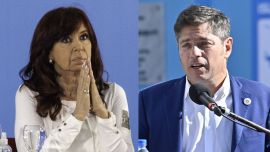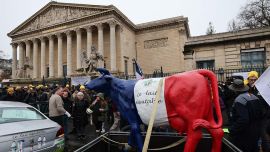President Alberto Fernández has brushed aside and defended the move to tighten restrictions on the purchase of foreign currency, reiterating that “dollars are needed to produce, not to save.”
Markets were hit by a wave of turbulence this week after the Central Bank announced drastic new currency controls to protect dwindling reserves. As well as restrictions on small savers, companies were also hit by new rules calling for companies that owe more than $1 million a month to refinance at least 60 percent of their debt maturing.
The move sparked criticism from experts, who warned it would increase distrust of the government and hinder the economic recovery. The Business Convergence Forum (Foro de Convergencia Empresarial) warned the move threatened “Argentina’s future sustainability.”
"The resolution that prevents Argentine companies from accessing the exchange market to cancel their obligations in dollars, restricting any possibility of new financing to the private sector, goes in the opposite direction to the recreation of an investment climate essential for the future," the group said in a statement.
Camilo Tiscornia, head of C&T Economic Advisors, said the decision was "very short-term" and taken only to tackle the loss of foreign currency. She added it “does not attack the root causes” of dwindling reserves.
Martín Redrado, a former Central Bank chief, described the measures as “a blow to the possibility of a rebound in the economy" that "does not generate more supply of foreign currency."
Reaction to the measures in the market was fierce too – the parallel “blue” dollar jumped from 131 to 145 pesos, although it closed the week in the 140-141 range. The official exchange rate at Banco Nación, meanwhile, inched up to 79.25 pesos per dollar yesterday from 78.75 pesos the previous Friday.
Fernández, speaking Wednesday, said the measures were a move to stop the US dollar being used as a “mechanism of speculation, a variable for some to accumulate."
The new measures were unveiled by Central Bank chief Miguel Ángel Pesce in a statement late Tuesday. He announced a 35 percent tax on dollar purchases by retail savers, which will apply on top of the previous 30 percent PAIS tax, more commonly known as the 'solidarity tax.' The extra levy will also affect credit card purchases in dollars.
The existing quota of US$200 per citizen per month, put in place last year by the Mauricio Macri administration, remains in place.
"The initiative intends to maintain the current monthly quota of US$200, but discourage the demand for foreign currency made by human persons for the purposes of hoarding and card expenses," the Central Bank said in a statement.
However, from now on, payments made for purchases in foreign currency with credit or debit cards will be subtracted from each citizens’ monthly quota of US$200.
To these restrictions on millions of small savers were added new capital controls for companies, obliging all owing over US$1 million of capital debt to refinance 60 percent with only 40 percent payable with dollars purchased from the Central Bank, as well as restricting the use of share transactions to obtain foreign exchange.
Firms facing the maturity of more than US$1 million in dollar-denominated debt per month would need to present a restructuring plan, Pesce added during a press conference in Buenos Aires.
The Central Bank also asked the CNV, the country’s securities regulator, to raise the minimum holding period on dollar assets received from abroad to 15 working days. The holding period, known locally as “parking,” will no longer be required for sales of dollar-denominated assets that settle in local currency.
Common practice
Buying dollars is a common practice of Argentines with a certain purchasing power who distrust the national currency and prefer to save in that currency in recurring contexts of crisis, devaluation and price increases.
The measures by the government in theory seek to reduce the gap between the official exchange rate and the black market (or blue dollar), which has soared to more than 70 percent as the country’s net international reserves have dwindled to less than US$7 billion.
Argentines have been buying dollars at a record pace as the peso loses value almost every day. More than 3.9 million people, or almost 10 percent of the country’s population, purchased greenbacks in July, according to recently published Central Bank data.
“We’re seeing a strong demand for savings in dollars,” Pesce told reporters. “Tomorrow will be a day of uncertainty,” he said.
International reserves currently stand at US$42.495 billion, said the Central Bank on Wednesday morning.
The announcement of more restrictions coincides with Fernández sending to Congress his first budget proposal, which included some rosy estimates for the crisis-prone economy.
Gross domestic product is projected to bounce back 5.5 percent in 2021 after a 12.1 percent contraction this year, the government said in its proposal, which was released a few minutes before the forex measures. Annual inflation is seen slowing to 29 percent next year, with the peso weakening to 102.4 per dollar and the country posting a 4.5 percent primary fiscal deficit, according to the plan.
While the government’s 2021 growth forecast is in line with economists’ expectations, inflation, a chronic weakness in Argentina, is forecast to be significantly higher than the official estimate, around 47 percent according to the Central Bank’s survey of economists.
Argentina hasn’t spoken to the International Monetary Fund about the new measures, the Central Bank said. The country is seeking to renegotiate a US$44-billion financing arrangement with the fund, and will ask to delay payments to the Fund through 2024, Economy Minister Martín Guzmán said last week.
Pesce claims companies see restructuring as ‘reasonable’
Argentina expects that most companies affected by a controversial new directive calling for them to restructure more than US$3 billion in debt will be able to do so smoothly, Central Bank chief Miguel Pesce said.
The rule calls for companies that owe more than US$1 million a month until March 31 to present a plan in which they refinance at least 60 percent of their debt maturing by then. Still, actually executing that plan will be voluntary, Pesce said in a telephone interview.
The restrictions – which officials estimated would apply to US$3.3 billion of debt – are the country’s latest attempt to hold on to US dollars as reserves fall.
“The Central Bank isn’t forcing anything,” Pesce said. “What we’re requesting is that private companies sit down with their creditors and try to restructure under these characteristics. We ask that they present a plan, which can be flexible.”
The institution held discussions with as many as six affected firms this week and heard back that the measure “seems reasonable to them,” he added. “They told us they believe they can get similar terms as the companies that did restructurings until now.”
– TIMES/AFP/AP/ BLOOMBERG


























Comments